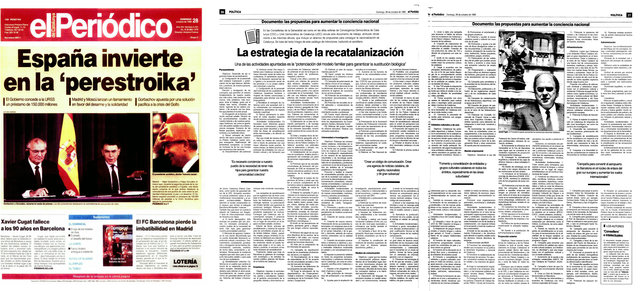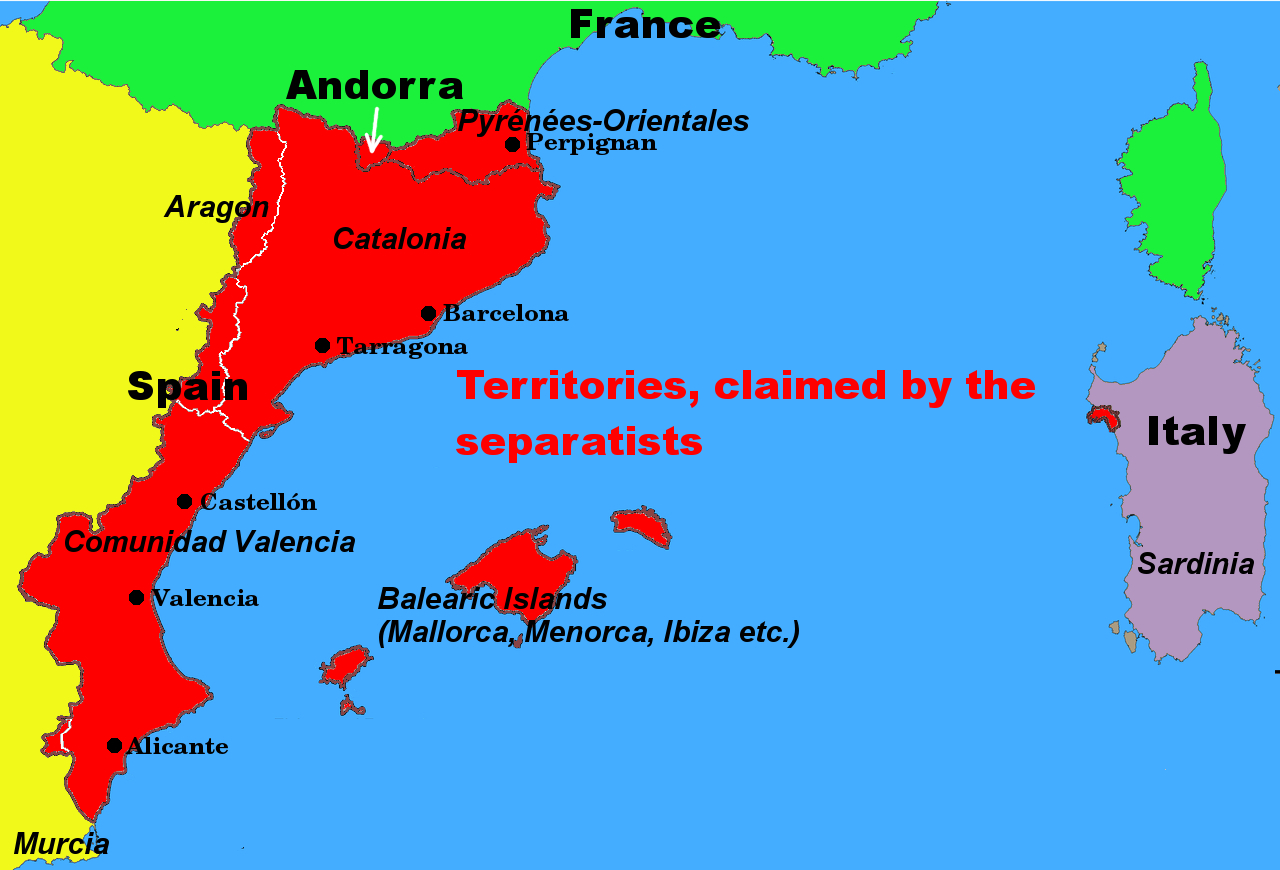| | | | And at continuation of this series about languages imposition and democracy Click here to subscribe or cancel your subscription |
In the autonomous regions of Spain there is language dispute and language imposition. You want to have some facts about languages? This series provides information and consists of 6 parts:
1. South Africa: Bloody insurrection against language imposition click, to read part 1
2. Catalonia: language imposition and the division of a nation click, to read part 2
3. Language imposition, falsification of history and indoctrination click, to read part 3
4. Language impositions in the Ukraine click, to read part 4
5. Ways out of language conflicts - What is Language? click, to read part 5
6. Language protection - does this work in France?
Language imposition and democracy
Part 6 Language protection - does this work in France?
Already the ancient Greek Heraclitus knew: „One cannot go twice into the same river“. The only constant in our universe is perpetual change, and evolution teaches us that only those who adapt survive. (Survival of the fittest)
This is not the case in France as far as language is concerned. France passed a law in 1994 to protect the French language[1]. This law of the then Minister of Culture Jacques Toubon is often ridiculed by many Frenchmen as „Loi Toubon“, because it can be understood as much as „All Good Law“. But it can also be understood as an imposition of language, as there are a lot of regional languages in France.
After being established in Article 1: French „...is the privileged link between the states that make up the French-speaking (francophone)community“, Article 2 states among other things: „...the use of French is compulsory. The same provisions apply to all written, oral and audiovisual advertisements.“
Already the term „Fracophonie“ is distinguishable in French only in written form. If the word is written in small letters, it refers to the French-speaking areas, in capital letters the term refers to the „Organisation internationale de la Francophonie“ (International Organisation of Francophonie), in which France - or at least the French government - probably still today - sees itself as a „protective and regulatory power“ in the former French colonies. If one speaks the word F/francophonie, the distinction between the (former) colonial empire and the linguistic zone is lost.
The use of non-French words in advertising in France is permitted only if the translation into French is of the same order of magnitude. This is to prevent the use of foreign words. How effective are these measures?
French could be understood as a mixed language itself, in simple terms it is a Latin language with local influences from the post-Roman period, always influenced by words from all countries of the world. The Académie française, guardian of the French language, lists[2] itself many foreign words and tries to suggest French or French sounding names for them. It is not surprising that today the English part outweighs the influence of other languages. Anyone who speaks French, for example, knows that despite all efforts „le weekend“ can no longer be banned from the French vocabulary.
Belgium, Canada, Quebec, Switzerland
Those who speak to French-speaking Walloons from Belgium will be surprised that „Ninety-nine“ does not mean „Quatre-vingt-dix-neuf“, i.e. „Four-Twenty-Ten-Nine“, but simply „Nonante-neuf“, that is exactly „Ninety-Nine“. Obviously the influence of the Académie française is already diminishing a few meters behind the border.
The Loi Toubon will not be able to stop the process of language development along the needs of people who speak French. This is also indicated by the fact that there is Canadian French and Québec French. They are French languages or dialects that differ both within Canada and to the French language in France. Quebecers are funny enough to use French words (e.g. arrêt, magazinage, stationnement, fin de semaine) in which the French have adopted English words (stop, shopping, parking, week-end). But mostly the opposite is the case. Canada's majority speaks English and the proximity of the USA does the rest.
The Quebec government, too, apparently considers it necessary to protect Quebec from this influence: On the Internet, on the „Site de l'Office québécois de la langue française“[3] form, the Quebec Office for the French Language has a French language lawsuit site, where you can lodge a complaint against the violation of the French language law, and a detailed description of the consequences and procedure of such a complaint is provided. A funny thing in this context is the Internet address of this language protection authority, which contains the abbreviation „faq“ (for the English „frequenty asked questions“). The policial protection of French does not even work in their own house. It has always been difficult to stop the course of history.
After all, English isn't imposed on anyone in Canada. This seems to make it easier for more and more Quebecers to choose English instead of French as a means of communication.[4]
The same is true of the Swiss, who quickly switch to English when dealing with French-speaking compatriots should it become difficult for them to understand.
In this respect, it was not surprising when you read in 2015 that „France is giving up the fight against English words“[5] The article reads: „For more than 20 years, France has defended itself by law against the intrusion of Anglicisms. The current Minister of Culture considers measures useless. Foreign words are an enrichment for her.“
It is a matter of concern that France has signed the European Charter for Regional and Minority Languages in 2019, but still has not ratified it. Even if you think you have to protect and be able to protect French, linguistic minorities should have the same rights with regard to their languages.
This was also made clear by the Society for Threatened Peoples, which in 2005, immediately after the signing of the European Language Charter by the French government, titled: „France's linguistic minorities urgently need protection“[6].
The world is changing fast, and if the entry of anglicisms into languages has been the norm in recent decades, with the emergence of China one may wonder when the first Chinese words will enter the English language.
Democratic language choice and integration
It's obvious. Trying to regulate a language is already difficult enough, even where it might make sense. Today's German generation no longer forms the subjunctive of verbs by conjugation, as it was done only 40 years ago. Nowadays they only know to do that by using the word „would“.
It is even more difficult with the imposition of language. Either it can be enforced with brutal force or it fails. This means that language imposition and democracy are as compatible as fire and water.
Wherever someone thinks he wants to use a certain language, he should be allowed to do so and not be discriminated for doing so. Wherever a minority demands that their children be taught in their mother tongue, this should be granted without exception in cases where it is an official language. Language bans and language coercion cannot be democratic in such circumstances.
One difficulty lies, of course, in the fact that if rulers refuse to recognise the language of a significant minority as an official language, and it is of course unclear what a significant minority is. We currently know this from Romania and Hungary and in history we also know it from the USA, where the Anglo-Saxons immigrated to the southern states of the USA and recognised neither Spanish nor French as official languages, let alone the languages of the indigenous peoples. Having only one official language is certainly an advantage - also for integration - on the one hand, and a disadvantage on the other. The „typical“ American is monolingual despite the many languages spoken and understood in his country.
It is also true that immigrants to an existing state must learn at least one of the official languages in order to integrate effectively. How else can one participate in political decisions? Such a language constraint is certainly democratically justified.
When must minority languages be recognised as official languages? There is no ready answer. Under conditions that allow a democratic approach to this problem, this can be very different and can hardly be decided in a single essay.
In this sense, languages do not need protection, linguistic minorities do. Even linguistic majorities, as can unfortunately be seen in all autonomous regions of Spain, where „certain people“ want to impose their language on the Spanish-speaking majority. An absurd situation in 21st century Europe.
| | We will report about this soon Meanwhile, you don't want to miss the latest news? | | Click here to subscribe or cancel your subscription |
Language protection - does this work in France?
[1] https://www.legifrance.gouv.fr/affichTexte.do?cidTexte=LEGITEXT000005616341
[2] http://www.academie-francaise.fr/le-dictionnaire-la-9e-edition/exemples-de-mots-dorigine-etrangere
[3] https://www.oqlf.gouv.qc.ca/francisation/respect/faq.html
[4] https://www.ledevoir.com/societe/504771/recensement-2016-le-quebec-est-plus-anglophone-le-canada-est-plus-bilingue
[5] https://www.welt.de/kultur/article138497201/Frankreich-gibt-Kampf-gegen-englische-Woerter-auf.html
[6] https://www.gfbv.de/de/news/frankreichs-sprachminderheiten-brauchen-dringend-schutz-252/
Myths and deceptions of Catalan nationalism

Here you'll find the translation
The strategy of recatalanization
 1980 the Spanish journal "El Periodico" published a secret document about the strategy of the Catalan government. It shows in a frightening way the actual spiritual world of the separatist leaders.
1980 the Spanish journal "El Periodico" published a secret document about the strategy of the Catalan government. It shows in a frightening way the actual spiritual world of the separatist leaders.Now it is available in english translation.
Pancatalanism
the separatist's imperial claim
 The Catalan government exports the conflict into communities with Catalan population, supporting all efforts of the separatists including financial means to destroy Spain.
The Catalan government exports the conflict into communities with Catalan population, supporting all efforts of the separatists including financial means to destroy Spain. An important tool is the establishment of a language dictatorship that is not afraid to use the same means as Franco.
Separatist indoctrination

Click here to read the study
Publications
 The title says: "Catalonia, a conflict is exported. Insights of a migrant"
The title says: "Catalonia, a conflict is exported. Insights of a migrant"Sorry, up to now, this book is only available in German. However, drop us a line, if you are interested to learn more Contact.
